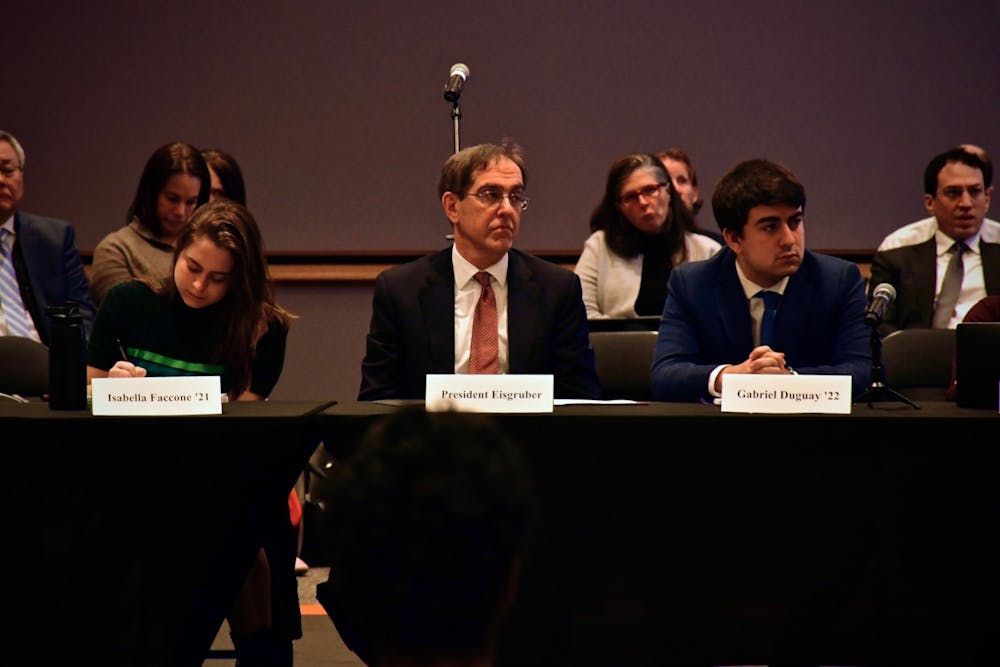During its Nov. 11 meeting, the Council of the Princeton University Community (CPUC) discussed both the external review and joint committee’s reports on the University’s Title IX policy, which were released on Oct. 24. Furthermore, the Council addressed the creation of the new ad hoc CPUC Committee on Sexual Climate, Culture and Conduct, which will replace the Faculty-Student Sexual Misconduct Committee.
This month’s meeting also featured many of the student activists who led the Princeton IX Now protest last May. At the meeting, the activists held up signs and participated during the post-presentation question.
The new committee will include representatives from nearly all facets of the University community, including undergraduate and graduate students, faculty members, and postdocs. Community members not on the committee were encouraged to bring issues forward for review.
“This group will take input from the community and review and provide input on the effectiveness of the University’s procedures, support services, and resources available to address instances of sex discrimination and sexual misconduct,” University Provost Deborah Prentice said.

Provost Deborah Prentice (left) and Vice President for Campus Life W. Rochelle Calhoun (second from left) at the CPUC meeting on Nov. 11, 2019.
Photo Credit: Jon Ort / The Daily Princetonian
This committee will be formally proposed in the December CPUC meeting.
The question of faculty punishment for sexual misconduct was raised, with Assistant Professor of Electrical Engineering Nathalie de Leon referring to the 2018 dismissal of then professor Sergio Verdú for sexual misconduct and harassment.
“The world is shifting under our feet in terms of what punishments we think are appropriate for various types of infractions, so to what extent is the University reevaluating whether or not precedent should be reconsidered?” de Leon asked.

Prentice responded that the University has recently taken actions to set “a new standard for punishment,” with Dean of the Faculty Sanjeev Kulkarni citing a 2018 policy change that mandates members found responsible for sexual harassment face a presumptive minimum penalty of a one-year, unpaid suspension.

Protestors behind members of the Council.
Photo Credit: Jon Ort / The Daily Princetonian
The signs held by student activists included messages such as, “U. admins — believe survivors” and “value our voices.” Those sentiments motivated the spring 2019 protests, which led the University to commission the reports.
One of the activists, Aisha Tahir ’21, noted a diversity issue in institutions that handle potentially sensitive situations, such as the Sexual Harassment/Assault Advising, Resources and Education (SHARE) office. She said that, as a result of the faces most in view at such organizations, essential conversations are portrayed in “monolithic” and “white-centered” terms.

In response, SHARE director Jackie Deitch-Stackhouse said the program maintains recruitment efforts “to make sure that we have folks who are representative of a variety of spaces and identities across our campus.”
Tori Gorton ’21 asked what tangible commitments the University would be making to ensure transparency surrounding the implementation of the recommendations.
“How will we be able to hold the University accountable to making sure these recommendations are implemented, and that they do have some student input?” she asked. “And in what ways would you be making meetings public, or will you be releasing updates about how things are continuing?”
Prentice answered by explaining how the new CPUC committee will be responsible for overlooking all facets of the implementation process.
“Through the CPUC process, which is the way we sort of engage the community in community-wide issues,” she said. “That would be the group that will be responsible for keeping the community both engaged and informed about this set of issues.”
The next CPUC meeting will be held on Dec. 9.








